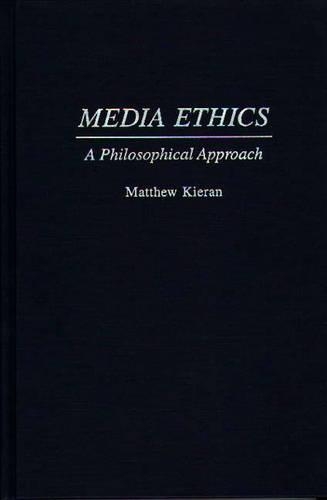
Media Ethics: A Philosophical Approach
(Hardback)
Available Formats
Publishing Details
Media Ethics: A Philosophical Approach
By (Author) Matthew Kieran
Bloomsbury Publishing PLC
Praeger Publishers Inc
16th September 1997
United States
Classifications
Tertiary Education
Non Fiction
Ethics and moral philosophy
Business ethics and social responsibility
174.9097
Physical Properties
Hardback
184
Description
From attempting to inform us about current events to entertaining us with imagined worlds, the media has a primary influence upon how we conceive the world, ourselves and others. Consequently, the moral complexities, dilemmas and duties that arise in relation to journalism and the media are difficult to negotiate. Critically developing a philosophical approach to conceptualizing the aim of journalism; the nature of good, impartial reporting; and moral restrictions concerning lies, deceit, violence and censorship, this book argues for substantive positions concerning what we should, rationally, hold as the moral rights and duties of journalists and the media.
Reviews
"Surrounded as we are by media on every side, few topics can be as pressing as the relation of the mass media to ethics. In this ground clearing book...Matthew Kieran provides the first sustained look at this topic by an analytic philosopher. With clarity and penetration, he examines issues ranging from journalism to pornography. His views may be sometimes controversial, but they are always stimulating and thoughtfully argued. This book opens new territory for philosophy. I predict that Kieran's book will launch a generation of media and philosophy courses throughout the English-speaking world."-Noel Carroll Monroe C. Beardsley Professor of the Philosophy of Art The University of Wisconsin at Madison
[K]. wisely illuminates a series of complex problems-including privacy, lies, sex, violence, and censorship-without either falling back on dogmatic absolutism or flopping into wishy-washy relativism. He has seen the "hot" movies (like Good Fellas and Natural Born Killers) and scoured the literature; he knows what he's thinking about.-Theological Studies
[M]edia Ethics does provide strong support for applying a philosophical approach to ethical decision making in the media. Media Ethics is an excellent resource to dispel the myth that media ethics is an oxymoron and to support the conviction that good media practice is not incompatible with the demand to be ethical.-Journalism & Mass Communication Quarterly
"K. wisely illuminates a series of complex problems-including privacy, lies, sex, violence, and censorship-without either falling back on dogmatic absolutism or flopping into wishy-washy relativism. He has seen the "hot" movies (like Good Fellas and Natural Born Killers) and scoured the literature; he knows what he's thinking about."-Theological Studies
"Media Ethics does provide strong support for applying a philosophical approach to ethical decision making in the media. Media Ethics is an excellent resource to dispel the myth that media ethics is an oxymoron and to support the conviction that good media practice is not incompatible with the demand to be ethical."-Journalism & Mass Communication Quarterly
"[K]. wisely illuminates a series of complex problems-including privacy, lies, sex, violence, and censorship-without either falling back on dogmatic absolutism or flopping into wishy-washy relativism. He has seen the "hot" movies (like Good Fellas and Natural Born Killers) and scoured the literature; he knows what he's thinking about."-Theological Studies
"[M]edia Ethics does provide strong support for applying a philosophical approach to ethical decision making in the media. Media Ethics is an excellent resource to dispel the myth that media ethics is an oxymoron and to support the conviction that good media practice is not incompatible with the demand to be ethical."-Journalism & Mass Communication Quarterly
Author Bio
MATTHEW KIERAN is Lecturer in Philosophy at the University of Leeds, England. He also teaches media ethics and has researched for the Broadcasting Standards Commission in the United Kingdom. His articles on aesthetics, ethics, and social philosophy have appeared in such journals as the Journal of Aesthetics and Art Criticism and the Journal of Communication.
